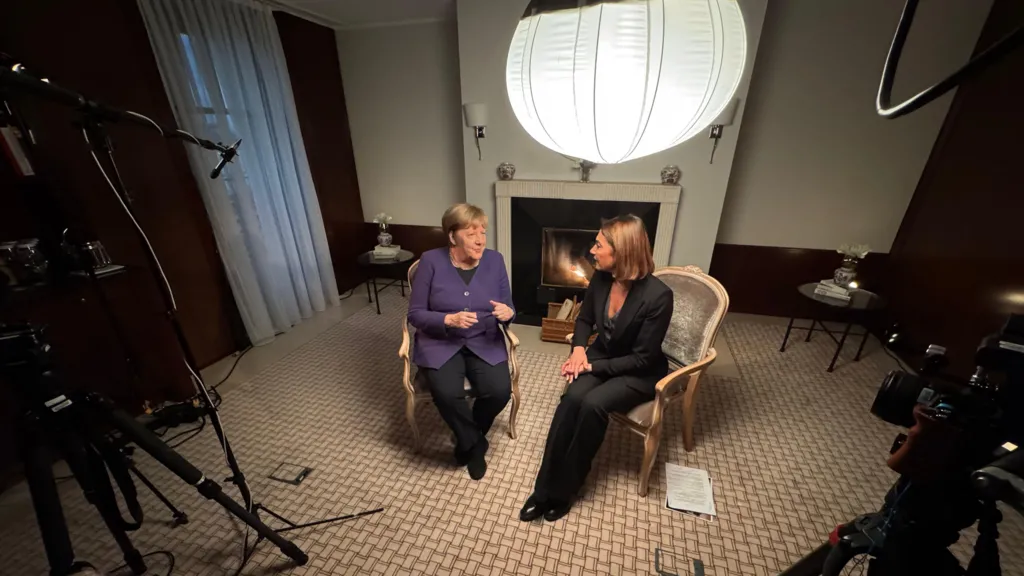Angela Merkel defends ties with Russia and blocking Ukraine from Nato
4 min read
Angela Merkel sat down for a rare interview with the BBC's Katya Adler
Angela Merkel, former Chancellor of Germany, has defended her approach to Russia and her decision to block Ukraine’s NATO membership in 2008, in a recent interview with the BBC. The 70-year-old leader, who served for 16 years, offered a detailed account of her policies on Russia, Ukraine, and other key issues, and reflected on her legacy in Europe and the world.
Merkel emphasized that the gas deals she secured with Russia were aimed at benefiting German businesses and maintaining peace with Moscow. She argued that these energy deals, though controversial, were part of her broader strategy to ensure Germany’s economic stability while managing its relationship with Russia. The pipelines linking Germany to Russia, she noted, were not just a business move but also a means of fostering peaceful relations with Russia, despite strong opposition from Eastern European countries like Poland.
Merkel’s stance on Ukraine’s NATO membership has been the subject of much debate. While some critics argue that her decision to block Ukraine’s NATO accession in 2008 emboldened Russia and contributed to the current war, Merkel firmly believes that the conflict would have erupted sooner if Ukraine had joined NATO at that time. “It was completely clear to me that President Putin would not have stood idly by and watched Ukraine join NATO,” she said. Merkel argued that Ukraine in 2008 was not as prepared to face such a confrontation and that her decision helped delay the war. Ukrainian President Volodymyr Zelensky, however, has described Merkel’s NATO decision as a “miscalculation,” suggesting that it empowered Russia and encouraged the invasion.
Merkel’s reflections on her legacy are complex, especially as she faces criticism for her handling of certain crises during her time in office. Despite high popularity during much of her tenure, she now finds herself defending her decisions, particularly regarding the energy relationship with Russia. The war in Ukraine and its subsequent energy crisis have caused Germany to re-evaluate its policies. Merkel admitted that the reliance on Russian energy has hurt Germany, with businesses now struggling under the high cost of imported LNG. She said the war in Ukraine had unfortunately marked the beginning of a “new era” in European relations with Russia.
Beyond energy policy, Merkel’s tenure also included the 2015 migration crisis, a defining moment of her leadership. She famously opened Germany’s borders to over a million refugees, a decision that was met with both praise and severe criticism. President Barack Obama lauded her for her moral courage, while many critics blamed her for strengthening the far-right political party Alternative for Germany (AfD), which has since become a major force in German politics. Merkel acknowledged the AfD’s rise but stood by her decision, arguing that the political climate in Europe was shaped by broader factors, and she could not be held accountable for the rise of far-right movements across the continent.
Merkel’s legacy is also tied to her cautious approach during the eurozone crisis. She was accused of imposing austerity measures on southern European countries in exchange for financial bailouts, which critics say hurt economies like Greece’s. However, Merkel’s supporters argue that her policies saved Europe from a more severe economic collapse. Even at home in Germany, Merkel’s decisions, particularly her failure to invest in infrastructure, have been questioned. Some argue that her focus on maintaining a balanced budget led to underinvestment in key areas like roads, railways, and digital infrastructure, contributing to Germany’s current economic sluggishness.
Merkel’s handling of international relations also remains a subject of intense scrutiny. She is credited with stabilizing Europe during her time in office, but her approach to China, Russia, and the US is now viewed through a more critical lens. In particular, her decision to prioritize economic ties with China and the US has led to Germany’s over-reliance on foreign trade, leaving the country vulnerable in times of geopolitical tension. With global power dynamics shifting, Merkel’s advice to current leaders is to stay focused on their priorities and engage directly with outspoken figures like former US President Donald Trump.
Despite the challenges, Merkel remains a figure of influence, and world leaders still seek her counsel. However, when asked if she misses the power and politics of leadership, she responded with a firm “No, not at all.” Merkel’s legacy will be shaped by her complex decisions, from energy policies to migration, and her pragmatic leadership through Europe’s most turbulent times. While some of her choices remain contentious, she stands by them, convinced they were made with the best intentions for Germany and Europe’s future.





